Pennsylvania (PA) Car Sales Tax & Fees [+Calculator]
January 30, 2024
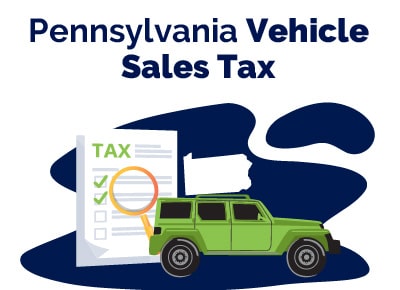

I am a serial entrepreneur and a consumer advocate. When I’m not helping car buyers, I love working on ventures that have a positive impact.
I run a cause marketing agency and serve on the board of Vayu Global Health where we are disrupting the medical industry and preventing the needless deaths of mothers and babies during childbirth.
If you're planning to buy a car in Pennsylvania, remember that the state has a 6% car sales tax.
Our guide makes understanding the sales tax easier and provides a calculator for accurate estimates. This tool aids in budgeting for your vehicle, accounting for the 6% sales tax and any additional local tax.
Find out how our calculator simplifies your Pennsylvania car sales tax calculation.
Table of Contents
- PA Car Sales Tax Video
- How Much Is the Car Sales Tax in Pennsylvania?
- How to Calculate Pennsylvania Sales Tax on a Car
- PA Sales Tax Calculator
- Do I Have to Pay Sales Tax on a Used Car?
- Which City Has the Highest Tax? Which City Has the Lowest?
- Car Sales Tax Table for Cities in Pennsylvania
- Car Sales Tax for Trade-Ins in Pennsylvania
- Car Sales Tax on Private Sales in Pennsylvania
- Tax on Rebates & Dealer Incentives
- Other Taxes & Fees in PA
- When Sales Tax Is Exempt in Pennsylvania
- Pennsylvania EV Rebates & Incentives
- Best Car Deals by Category
- Frequently Asked Questions
PA Car Sales Tax Video
How Much Is the Car Sales Tax in Pennsylvania?
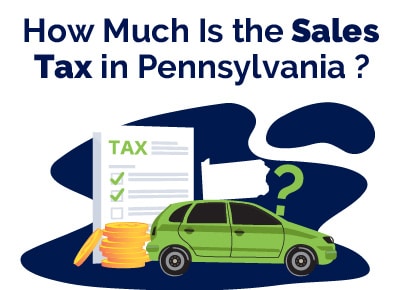 The car sales tax in Pennsylvania (PA) is 6% of the purchase price or the current market value of the vehicle (according to the PennDOT facts sheet).
The car sales tax in Pennsylvania (PA) is 6% of the purchase price or the current market value of the vehicle (according to the PennDOT facts sheet).
For instance, if your new car costs you $25,000, you can expect to pay an additional $1,500 in state sales tax alone.
That’s not including any city or county taxes that could be added on top of that number. The most you can expect to pay in local taxes is an additional 2%, but Pennsylvania's average local sales tax is 0.166%.
How to Calculate Pennsylvania Sales Tax on a Car
Use this simple formula to calculate how much you need to expect to pay in state sales tax on your car.
First, take the purchase price for your vehicle. Then, deduct the value of any trade-ins or rebates you have (note that Pennsylvania does not tax you on rebates).
Once you have that number, multiply it by 6% to get the cost of the state sales tax on your new vehicle.
Calculate Sales Tax in Pennsylvania Example:
- Initial Car Price: $25,000
- Sales Tax Rate: 6%
- Trade-In Amount: $5,000
- Rebate/Incentive Amount: $1,000
Sales Tax = ($25,000 - $5,000 - $1,000) * .06
Sales Tax = $1,140
PA Sales Tax Calculator
Do I Have to Pay Sales Tax on a Used Car?
Yes. In Pennsylvania, you will have to pay the same 6% sales tax for both used and new vehicles.
Which City Has the Highest Tax? Which City Has the Lowest?
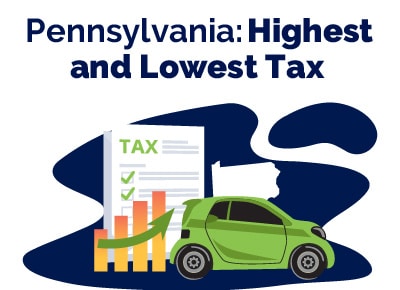 Along with state taxes that are imposed statewide throughout Pennsylvania, some cities and counties within the state require new owners of a vehicle to pay an additional city or county tax.
Along with state taxes that are imposed statewide throughout Pennsylvania, some cities and counties within the state require new owners of a vehicle to pay an additional city or county tax.
The highest city tax is in Philadelphia, the largest city in the state. Philadelphia requires people buying cars to pay an additional 2% sales tax on top of the state’s 6% one, meaning if you register your car in Philadelphia, you will be paying a total of 8% sales tax on that new car.
The lowest city tax is any city outside of Philadelphia or Allegheny county, as those are the only two places in Pennsylvania that charge an additional tax.
Car Sales Tax Table for Cities in Pennsylvania
| City | State Sales Tax | Additional Local Tax | Total Sales Tax |
|---|---|---|---|
| Philadelphia | |||
| Pittsburgh | |||
| Allentown | |||
| Erie | |||
| Reading | |||
| Scranton | |||
| Bethlehem | |||
| Lancaster | |||
| Harrisburg | |||
| York |
Car Sales Tax for Trade-Ins in Pennsylvania
There is no car sales tax charged for trade-ins in the state of Pennsylvania.
For example, if you purchase a car that costs $40,000 and your trade-in is valued at $7,000, you will only pay the 6% sales tax on the $33,000 price tag.
Car Sales Tax on Private Sales in Pennsylvania
The car sales tax on private vehicle sales in the state of Pennsylvania is 6%.
Tax on Rebates & Dealer Incentives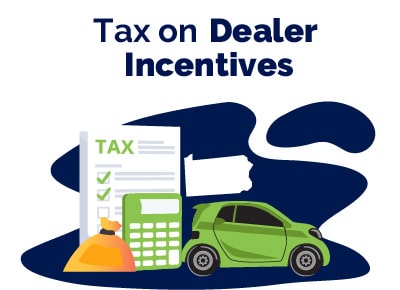
There are no taxes on rebates or dealer incentives in Pennsylvania.
For example, if you are purchasing a car at $40,000 that offers a $2,500 rebate, you will only be taxed on the $37,500 that you actually pay for the car.
Other Taxes & Fees in PA
Here are a few of the other fees and taxes that you will have to pay before you can drive that new car off the lot.
PA DMV/State Fees
Every state’s DMV has different fees associated with purchasing a new car. Here are some charges you can expect from the Pennsylvania DMV.
- Passenger Vehicle Registration: $45
- Replacement of Registration Plate: $13
- Title Fee: $67
PA Dealership Fees
Along with state-related fees, dealerships can also charge you a documentation fee. This fee covers the cost of the dealership preparing legal and sales documents for your sale.
The average price for a documentation fee in Pennsylvania is around $130.
This price is determined by the dealership itself and not the state, although some states impose a maximum limit they can charge.
When Sales Tax Is Exempt in Pennsylvania
There are a few reasons that a vehicle may be exempt from sales tax in the state of Pennsylvania.
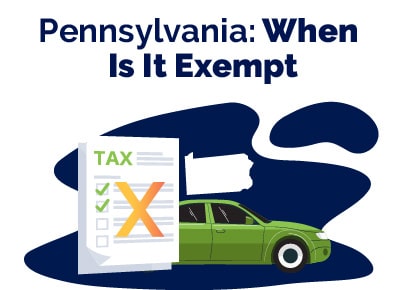
Among them:
- Transfer as a gift
- Transfer as inheritance
- Transfer from a business operated as a sole proprietorship to the actual owner
- Transfer from spouse to spouse
- Transfer to winner or raffle
- Leasing a vehicle
Pennsylvania EV Rebates & Incentives
Going green and buying an electric or hybrid vehicle in Pennsylvania could save you some money. In addition to the federal rebate, here are some incentives specific to Pennsylvania:
Pennsylvania residents can apply for a rebate within six months of purchasing a new, pre-owned, or demonstration electric vehicle for under $50,000.
Rebate recipients will receive $2,000 for electric vehicles.
Those purchasing a plug-in hybrid vehicle will receive a rebate of $1,500.
Tax information and rates are subject to change, please be sure to verify with your local DMV.
Best Car Deals by Category
Frequently Asked Questions
What is the sales tax on cars purchased in Pennsylvania?
In Pennsylvania, the standard sales tax rate for vehicles is 6%. This applies to both new and used cars purchased within the state.
Do I have to pay sales tax on a used car in Pennsylvania?
Yes, the same 6% sales tax rate applies to used cars. It's calculated based on the purchase price or the current market value of the vehicle.
Which city in Pennsylvania has the highest and lowest car sales tax?
Philadelphia has the highest vehicle sales tax rate in Pennsylvania at 8%, which includes the state sales tax of 6% plus an additional local sales tax of 2%. Cities outside of Philadelphia and Allegheny County have the lowest tax rate, sticking to the standard state sales tax of 6% without additional local taxes.
Do I have to pay sales tax on a gifted car in Pennsylvania?
No, vehicles received as gifts are exempt from sales tax in Pennsylvania. However, documentation proving the vehicle was gifted is required to qualify for this exemption.
Does a trade-in reduce sales tax in Pennsylvania?
Yes, trading in a vehicle reduces your taxable payment. The sales tax is calculated on the price difference between the new vehicle and the trade-in value.
How can I avoid paying sales tax in Pennsylvania?
Sales tax can be avoided on vehicles that are gifted, inherited, or transferred from a sole proprietor business to the owner's name. Documentation and proper procedures must be followed to qualify for these exemptions.
Is there a sales tax on leasing a vehicle in Pennsylvania?
Yes, leasing a vehicle in Pennsylvania is subject to sales tax. The tax is applied to the lease payments and any additional charges under the lease agreement.
Can I claim a tax deduction for a vehicle purchased for business use in Pennsylvania?
Yes, vehicles purchased for business use may qualify for tax deductions. Consult a tax professional for specifics regarding deductions and eligible expenses.
What happens if I buy a car in another state but live in Pennsylvania?
If you reside in Pennsylvania but purchase a vehicle in another state, you are still required to pay Pennsylvania's sales tax when registering the vehicle in Pennsylvania.
Posted in Car Buying Tips |




